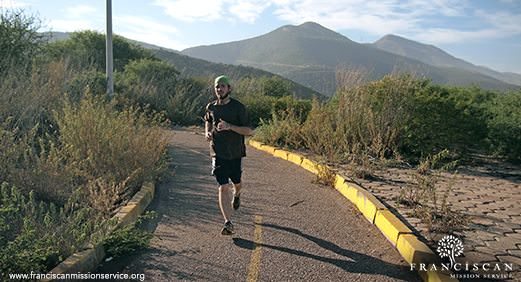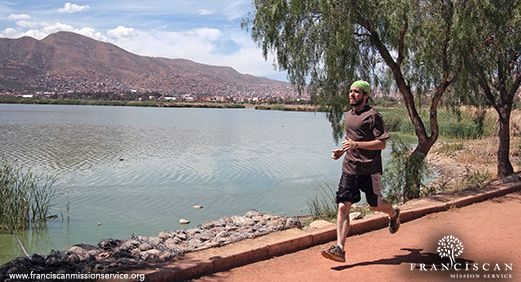Marathon Training on Mission

Editor’s note: As fourth-year missioner Jeff Sved prepares for the May 1 Pittsburgh Marathon, he answers some frequently asked questions about his training. Jeff is currently serving in three prisons in Cochabamba, Bolivia, and hopes his participation in the marathon can raise awareness about how the prison rehabilitation system should be focusing on restoring relationships instead of destroying them.
This post is part one of two.
How are you feeling about the race?
GREAT! I’ve been intentionally training for 14 weeks now (roughly 70 runs) and already completed my longest runs, so at this point I’m just trying to avoid injury and stay loose. I’d say there’s something special about running my first marathon in my hometown. Over the next couple weeks I’m trying to switch over to carrying a water bottle and practice running while waving my Terrible Towel! My lungs should be able to handle breathing and chanting HERE WE GO STEELERS!
I am a little nervous about the culture shock. I have no clue how I’ll handle running around a big city with 40,000 other participants so shortly after landing from Bolivia. I’ve only given myself three or four days to transition, and from what I remember of my last visit, those first few days were very overwhelming.
What is your goal time?
Currently I’m looking at 3:20:00, though I may push myself and line up with the 3:15:00 pacer. We’ll see how I feel on race day. I have no clue what my pace will be at the marathon in Pittsburgh because I’ve been training at approximately 9,000 feet, and from what I’ve been told, the altitude has the medically equivalent effect of blood-doping. My muscles are used to functioning with less oxygen so I’m not sure what my body will do with ALL THE EXTRA OXYGEN! Theoretically it gives me a huge boost with endurance so it should take less effort to maintain my pace in Pittsburgh than in Cochabamba.
What other races/distances have you done?
This will be my first full marathon. Currently my longest training run has been 20.35 miles, which I’ve run three separate times. As part of my training each of those 20ers were the day after a hard 10 mile run; it’ll be nice to run 26.2 after a rest day!
I ran my first and only half in Cochabamba in July 2014 in roughly 1:48:00. We’ve had a couple 10Ks this year that I’ve run here as well. A highlight was the Powerade Maraton Nocturnal (10k) which was the first time I’ve been able to run after dark in years.
Where do you run?
I generally have one spot where I run: Laguna Alalay (a small lake) and the ciclovia (bike path). The path around the laguna is a 7km loop or 4.35 miles that is part of the larger bike path. The ciclovia veers off from the laguna and zigzags up the side of a big hill up towards the Cristo (largest statue of Jesus in the world) before flattening out around the Jardin Botanico and looping into the northern zone of the city.
It is a very interesting view going from the southern to northern zones and back in one run because the economic divide between the two is pretty drastic, with the southern zone being the more impoverished area. Honestly, the culture shock entering into the northern zone is similar to what I felt during my previous US visit. By the time I reach my turn-around point on my longer runs, I can’t wait to get back closer to the southern zone which feels more much like home to me at this point.
One of my favorite views in Cochabamba is sunset over the laguna as I’m winding back down the Cristo hill. Though I have to be careful to still pay attention to the path and not just the sunset… a few weeks ago I got my shoes and legs caught in barbed wire when I got distracted by sunset!
Fun fact: Because of the altitude I’ve shared this “training facility” with the marathoners from the Chilean Olympic team. They’ve been here getting ready to run in Rio.
What time of day do you run?
I try to run twice a week at sunrise, and the other three at sunset. My Lenten promise this year was actually adding sunrise runs… there is something so spiritually filling or life-giving about being present during those first rays of the new day’s sun. And with the mountains here, the sun is already so far overhead when it peaks over the mountains so it is more of an immersion in the glow of dawn than watching a sunrise.
At this altitude the direct sunlight is BRUTAL. A few weeks ago during the brief rainy season there was a bit more flexibility, but now it’s a pretty short window where it’s just cool enough to run before it’s too dark for it to be safe. Long runs are particularly challenging since that’s three-ish hours, at that point it’s impossible to avoid the heat and so trying to hydrate becomes really important.
What nutrition do you carry?
Water!
Do you listen to music?
Nope, the only music is whatever songs get stuck in my head. My favorite is probably “We Didn’t Start the Fire” – though I’m pretty far short of my goal to memorize all the lyrics. “American Pie” is good for passing a mile or two. The strangest from recent runs was “Baby Beluga”… I listened to a ton of Raffi as a kid. Mainly I use the space and time to process and reflect.
One of my favorite lines from Thomas Merton, is a simple response to a question about how he prayed. His beautifully profound response was “I breathe.” Running for me has become an intentional time to simply breathe and focus on each breath as I put one foot in front of another. It is how I stay centered.
What have been some of the challenges of training in Cochabamba?
Water insecurity. We live in a zona (neighborhood) where water is a bit scarce. There was a month awhile back where I finally caved in and asked a friend if I could shower at their place… a 40-mile week without being able to shower with the sweat/salt build up was bordering on too much.
Hydration. My go-to water refuel here are these half-liter water pouches that any tienda has for 0.50ctvs. They are very easy to carry to run with, and very easy to drink out of. You simply bite a hole in the corner and can suck out some water as you want it. I’ve become very accustomed to hydrating like this and know that in Pittsburgh I’ll struggle with physically stopping to gulp down water from paper/plastic cups at hydration stations (so I’m training with water bottles now). During my half marathon in Cochabamba, volunteers and friends had water pouches and could toss them to you to run with and drink as needed.
Wild dogs. Wild dogs make running in many places IMPOSSIBLE. In some places you have to be careful just walking down the street. That’s the perk of running at the laguna, but even along the ciclovia there are a few spots I know to walk with rock in hand to be ready. Once I tried running around the big oil refinery near our apartment, but it was more of a walk because I kept having to bend down to pick up rocks… and was the only time I’ve been completely surrounded by a pack. Luckily a tienda (store) owner saw and gave me a hand.
Do you run alone?
I’ve been running five times a week and at least three of those are solo. There are a few other missioners/volunteers that I have run with and a couple that are still here that I run with each week. My training buddy relocated to the U.S. in February, and is running his marathon TODAY! (GOOD LUCK PATRICK IN CARMEL, IN) He is a good bit faster than I am, so it was nice to have someone who could pace me on my longer runs or on my “fast” medium runs.
I was joking with some friends in San Antonio, one of the prisons I visit, about doing some training runs in the prison together. It would be tons of a there-and-back kind of thing in their small futbol cancha, which also doubles as a work space and chapel. Well, before we got too far into planning, there was a group of inmates who were doing a similar workout of sprints that got accused of their exercise being “prepping for an escape attempt.” That quickly eliminated our chances of running together.
What do you like about running and how did you get into it?
I’m heading off for my last 10+ miler before the marathon! So what if I answer this question and others for next week? Please check back next Sunday for the next post.
*Photo Credit: Jason Obergfell
Tagged in:

